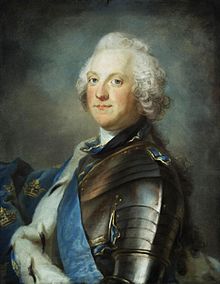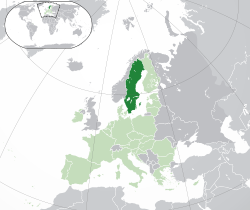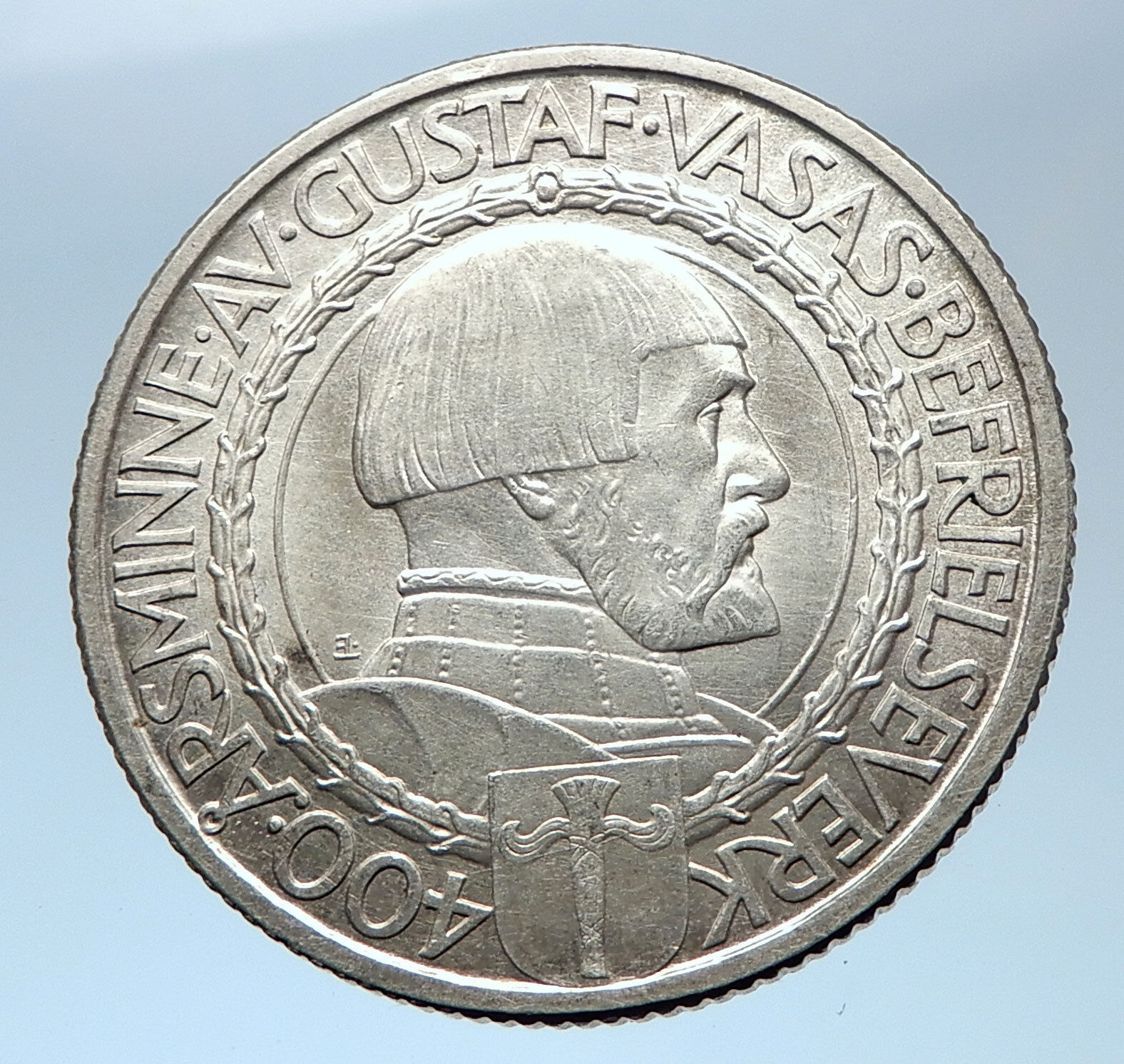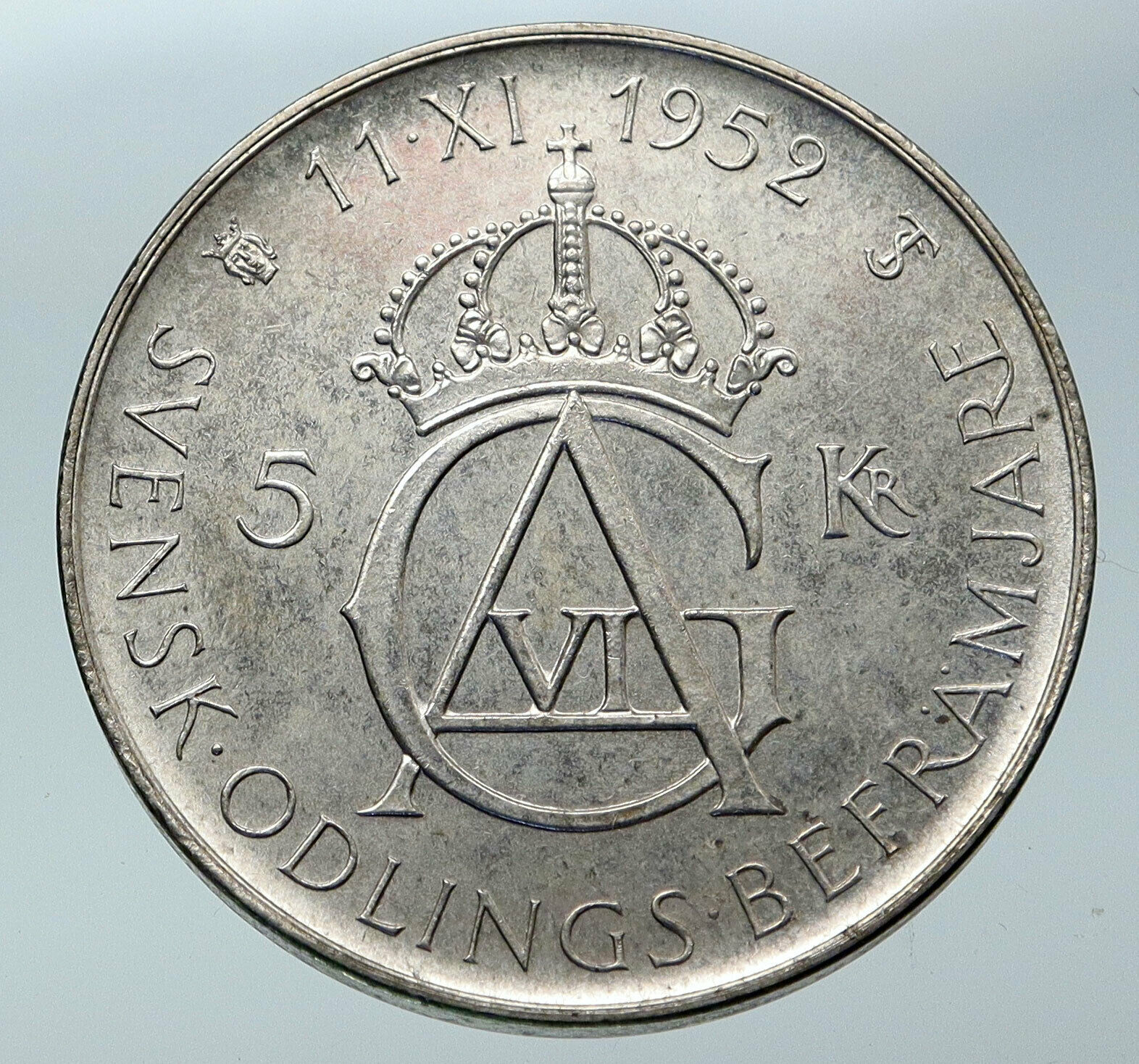|
Sweden under Adolf Frederick – King: 25 March 1751 – 12 February 1771
1759 Copper 2 Öre Silvermynt 33mm (28.70 grams)
Reference: KM# 461 (1751-68)
A·F· S·G· V· R·, Crowned shield with a rampant lion within, flanked by the Three Crowns of Sweden.
2.ÖR.S.M., Crossed arrows, Crown of Sweden above.
You are bidding on the exact item pictured, provided with a Certificate of Authenticity and Lifetime Guarantee of Authenticity.
 Adolf Frederick, or Adolph Frederick (Swedish: Adolf Fredrik, German: Adolf Friedrich; 14 May 1710 – 12 February 1771) was King of Sweden from 1751 until his death. He was the son of Christian August of Holstein-Gottorp, Prince of Eutin, and Albertina Frederica of Baden-Durlach. Adolf Frederick, or Adolph Frederick (Swedish: Adolf Fredrik, German: Adolf Friedrich; 14 May 1710 – 12 February 1771) was King of Sweden from 1751 until his death. He was the son of Christian August of Holstein-Gottorp, Prince of Eutin, and Albertina Frederica of Baden-Durlach.
The first king from the House of Holstein-Gottorp, Adolf Frederick was a weak monarch, installed as first in line to the throne following the parliamentary government’s failure to reconquer the Baltic provinces in 1741–43. Aside from a few attempts, supported by pro-absolutist factions among the nobility, to reclaim the absolute monarchy held by previous monarchs, he remained a mere constitutional figurehead until his death.
His reign saw an extended period of internal peace. However, the finances stagnated following failed mercantilist doctrines pursued by the Hat administration. The Hat Administration ended during the 1765–66 parliament, where the Cap opposition took over the government and enacted reforms towards greater economic liberalism, as well as a Freedom of Press Act. The Freedom of Press Act is unique for the time for its curtailing of all censorship, retaining punitive measures only for libeling the monarch or the Church of Sweden.
 Sweden, officially the Kingdom of Sweden, is a Scandinavian country in Northern Europe. It borders Norway and Finland, and is connected to Denmark by a bridge-tunnel across the Öresund. At 450,295 square kilometres (173,860 sq mi), Sweden is the third-largest country in the European Union by area, with a total population of over 9.8 million. Sweden consequently has a low population density of 21 inhabitants per square kilometre (54/sq mi), with the highest concentration in the southern half of the country. Approximately 85% of the population lives in urban areas. Southern Sweden is predominantly agricultural, while the north is heavily forested. Sweden is part of the geographical area of Fennoscandia. Sweden, officially the Kingdom of Sweden, is a Scandinavian country in Northern Europe. It borders Norway and Finland, and is connected to Denmark by a bridge-tunnel across the Öresund. At 450,295 square kilometres (173,860 sq mi), Sweden is the third-largest country in the European Union by area, with a total population of over 9.8 million. Sweden consequently has a low population density of 21 inhabitants per square kilometre (54/sq mi), with the highest concentration in the southern half of the country. Approximately 85% of the population lives in urban areas. Southern Sweden is predominantly agricultural, while the north is heavily forested. Sweden is part of the geographical area of Fennoscandia.

 Germanic peoples have inhabited Sweden since prehistoric times, emerging into history as the Geats/Götar and Swedes/Svear and constituting the sea peoples known as the Norsemen. Sweden emerged as an independent and unified country during the Middle Ages. In the 17th century, it expanded its territories to form the Swedish Empire, which became one of the great powers of Europe until the early 18th century. Swedish territories outside the Scandinavian Peninsula were gradually lost during the 18th and 19th centuries, beginning with the annexation of present-day Finland by Russia in 1809. The last war in which Sweden was directly involved was in 1814, when Norway was militarily forced into personal union. Germanic peoples have inhabited Sweden since prehistoric times, emerging into history as the Geats/Götar and Swedes/Svear and constituting the sea peoples known as the Norsemen. Sweden emerged as an independent and unified country during the Middle Ages. In the 17th century, it expanded its territories to form the Swedish Empire, which became one of the great powers of Europe until the early 18th century. Swedish territories outside the Scandinavian Peninsula were gradually lost during the 18th and 19th centuries, beginning with the annexation of present-day Finland by Russia in 1809. The last war in which Sweden was directly involved was in 1814, when Norway was militarily forced into personal union.
Since then, Sweden has been at peace, maintaining an official policy of neutrality in foreign affairs. The union with Norway was peacefully dissolved in 1905, leading to Sweden’s current borders. Though it was formally neutral through both world wars, Sweden engaged in humanitarian efforts, such as taking in refugees from German-occupied Europe. After the end of the Cold War, Sweden joined the European Union on 1 January 1995, but declined NATO membership.
Today, Sweden is a constitutional monarchy and a parliamentary democracy, with the Monarch as the head of state. The capital city is Stockholm, which is also the most populous city in the country. Legislative power is vested in the 349-member unicameral Riksdag. Executive power is exercised by the Government, chaired by the Prime Minister. Sweden is a unitary state, currently divided into 21 counties and 290 municipalities.
Sweden maintains a Nordic social welfare system that provides universal health care and tertiary education for its citizens. It has the world’s eighth-highest per capita income and ranks highly in numerous metrics of national performance, including quality of life, health, education, protection of civil liberties, economic competitiveness, equality, prosperity and human development. Sweden has been a member of the European Union since 1 January 1995, but declined Eurozone membership following a referendum. It is also a member of the United Nations, the Nordic Council, Council of Europe, the World Trade Organization and the Organisation for Economic Co-operation and Development (OECD).
|





 Adolf Frederick, or Adolph Frederick (Swedish: Adolf Fredrik, German: Adolf Friedrich; 14 May 1710 – 12 February 1771) was King of Sweden from 1751 until his death. He was the son of Christian August of Holstein-Gottorp, Prince of Eutin, and Albertina Frederica of Baden-Durlach.
Adolf Frederick, or Adolph Frederick (Swedish: Adolf Fredrik, German: Adolf Friedrich; 14 May 1710 – 12 February 1771) was King of Sweden from 1751 until his death. He was the son of Christian August of Holstein-Gottorp, Prince of Eutin, and Albertina Frederica of Baden-Durlach. Sweden, officially the Kingdom of Sweden, is a Scandinavian country in Northern Europe. It borders Norway and Finland, and is connected to Denmark by a bridge-tunnel across the Öresund. At 450,295 square kilometres (173,860 sq mi), Sweden is the third-largest country in the European Union by area, with a total population of over 9.8 million. Sweden consequently has a low population density of 21 inhabitants per square kilometre (54/sq mi), with the highest concentration in the southern half of the country. Approximately 85% of the population lives in urban areas. Southern Sweden is predominantly agricultural, while the north is heavily forested. Sweden is part of the geographical area of Fennoscandia.
Sweden, officially the Kingdom of Sweden, is a Scandinavian country in Northern Europe. It borders Norway and Finland, and is connected to Denmark by a bridge-tunnel across the Öresund. At 450,295 square kilometres (173,860 sq mi), Sweden is the third-largest country in the European Union by area, with a total population of over 9.8 million. Sweden consequently has a low population density of 21 inhabitants per square kilometre (54/sq mi), with the highest concentration in the southern half of the country. Approximately 85% of the population lives in urban areas. Southern Sweden is predominantly agricultural, while the north is heavily forested. Sweden is part of the geographical area of Fennoscandia.
 Germanic peoples have inhabited Sweden since prehistoric times, emerging into history as the Geats/Götar and Swedes/Svear and constituting the sea peoples known as the Norsemen. Sweden emerged as an independent and unified country during the Middle Ages. In the 17th century, it expanded its territories to form the Swedish Empire, which became one of the great powers of Europe until the early 18th century. Swedish territories outside the Scandinavian Peninsula were gradually lost during the 18th and 19th centuries, beginning with the annexation of present-day Finland by Russia in 1809. The last war in which Sweden was directly involved was in 1814, when Norway was militarily forced into personal union.
Germanic peoples have inhabited Sweden since prehistoric times, emerging into history as the Geats/Götar and Swedes/Svear and constituting the sea peoples known as the Norsemen. Sweden emerged as an independent and unified country during the Middle Ages. In the 17th century, it expanded its territories to form the Swedish Empire, which became one of the great powers of Europe until the early 18th century. Swedish territories outside the Scandinavian Peninsula were gradually lost during the 18th and 19th centuries, beginning with the annexation of present-day Finland by Russia in 1809. The last war in which Sweden was directly involved was in 1814, when Norway was militarily forced into personal union.




